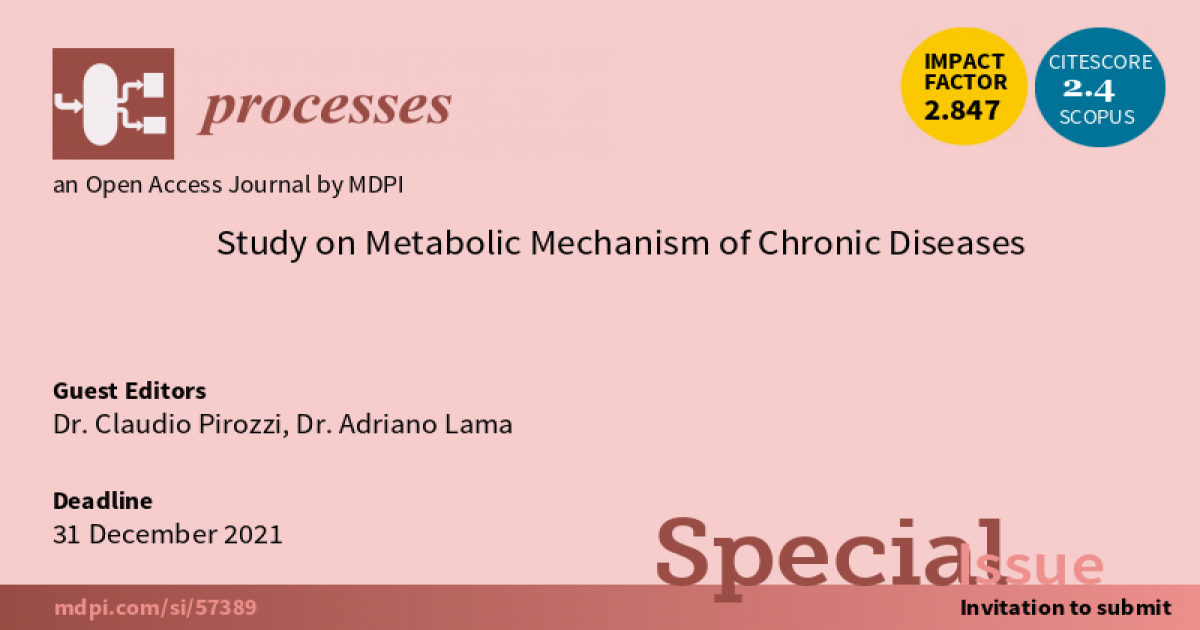- 2.8Impact Factor
- 5.5CiteScore
- 15 daysTime to First Decision
Study on Metabolic Mechanism of Chronic Diseases
This special issue belongs to the section “Pharmaceutical Processes“.
Special Issue Information
Dear Colleagues,
Recently, many clinical studies have been performed to develop new therapeutic strategies for the treatment of metabolic disorders, including obesity, insulin resistance, diabetes, metabolic syndrome. Metabolic alterations related to incorrect dietary habits including fat overnutrition have become common, threatening public health, markedly enhancing the onset and the progression of metabolic diseases and associated immunological and inflammatory complications. However, many researchers have mainly focused on functional studies which attempt to discover metabolic mechanisms of these chronic pathologies.
This Special Issue welcomes papers on research characterized by in vitro and in vivo approaches aimed at identifying specific molecular mechanisms in controlling metabolic diseases caused by lipid overload or high-fat diets in addition to counteracting the associated disorders involving the induction of inflammatory process and immune response.
We welcome papers on the following topics:
- Study of metabolic mechanisms underlying chronic diseases
- Discovery of prophylactic and/or therapeutic approaches for the treatment of chronic diseases
- In vitro/in vivo models of fat overnutrition and/or lipid overload which mimic the alterations characterizing metabolic disorders, such as obesity and/or diabetes
- Metabolic analysis of various factors in vivo in animal disease models (chronic metabolic diseases, including obesity, diabetes, and insulin and/or leptin resistance)
- Immune-metabolic dysfunction induced by chronic diseases
- Low-grade inflammation and/or oxidative/mitochondrial damage associated with metabolic pathologies and their mechanisms
- Study of the gut–brain axis and its involvement in mental disorders
- The connection between metainflammation and neuroinflammation
- The influence of metabolic alterations in worsening neuropsychiatric disorders
Dr. Claudio Pirozzi
Dr. Adriano Lama
Guest Editors
Manuscript Submission Information
Manuscripts should be submitted online at www.mdpi.com by registering and logging in to this website. Once you are registered, click here to go to the submission form. Manuscripts can be submitted until the deadline. All submissions that pass pre-check are peer-reviewed. Accepted papers will be published continuously in the journal (as soon as accepted) and will be listed together on the special issue website. Research articles, review articles as well as short communications are invited. For planned papers, a title and short abstract (about 250 words) can be sent to the Editorial Office for assessment.
Submitted manuscripts should not have been published previously, nor be under consideration for publication elsewhere (except conference proceedings papers). All manuscripts are thoroughly refereed through a single-blind peer-review process. A guide for authors and other relevant information for submission of manuscripts is available on the Instructions for Authors page. Processes is an international peer-reviewed open access semimonthly journal published by MDPI.
Please visit the Instructions for Authors page before submitting a manuscript. The Article Processing Charge (APC) for publication in this open access journal is 2400 CHF (Swiss Francs). Submitted papers should be well formatted and use good English. Authors may use MDPI's English editing service prior to publication or during author revisions.
Keywords
- Chronic metabolic disorders
- In vitro and in vivo mechanistic studies of metabolic diseases
- Fat overnutrition or high-fat diets
- Cell lipid overload which resembles the metabolic alterations characterizing obesity and insulin and leptin resistance
- Understanding immunological involvement through cells and animal models
- Metainflammation
- Oxidative/mitochondrial damage as mechanisms of metabolic pathologies
- Interconnection between metabolic alterations and mental disorders
- Gut–brain axis

Benefits of Publishing in a Special Issue
- Ease of navigation: Grouping papers by topic helps scholars navigate broad scope journals more efficiently.
- Greater discoverability: Special Issues support the reach and impact of scientific research. Articles in Special Issues are more discoverable and cited more frequently.
- Expansion of research network: Special Issues facilitate connections among authors, fostering scientific collaborations.
- External promotion: Articles in Special Issues are often promoted through the journal's social media, increasing their visibility.
- Reprint: MDPI Books provides the opportunity to republish successful Special Issues in book format, both online and in print.


